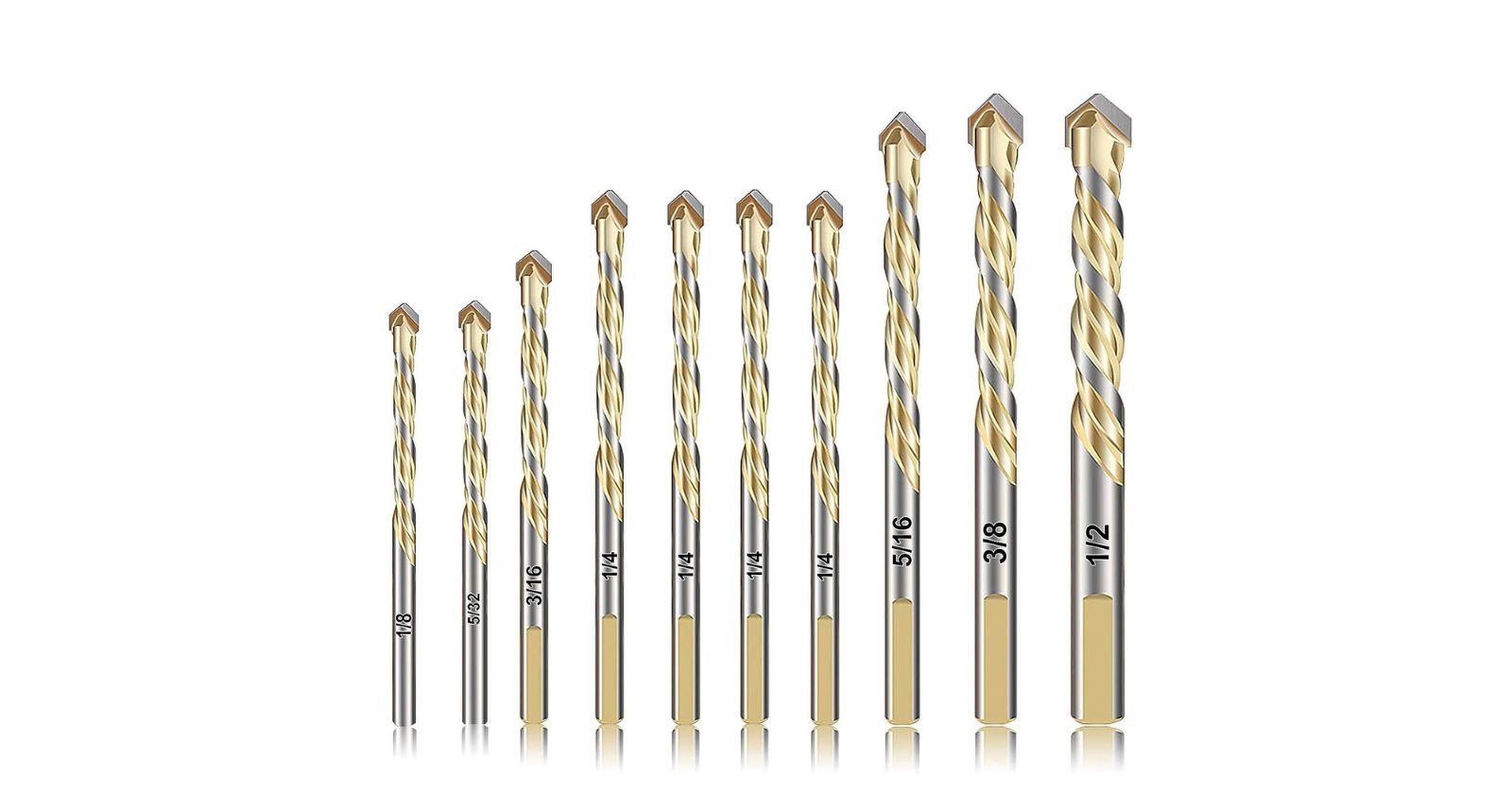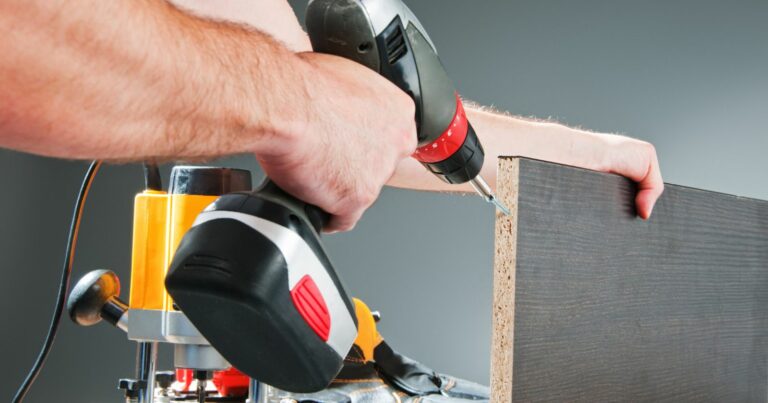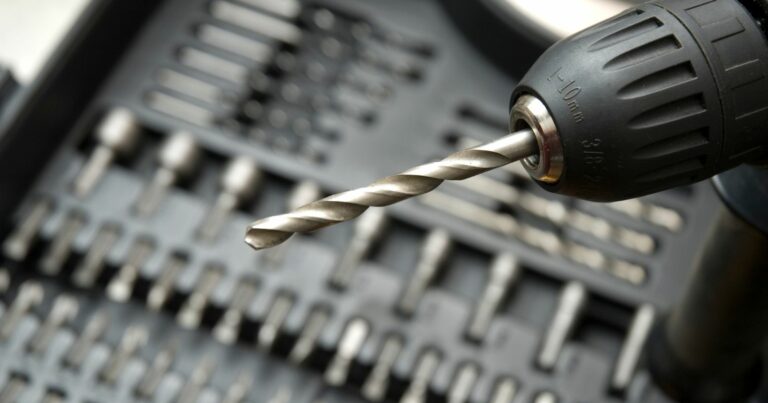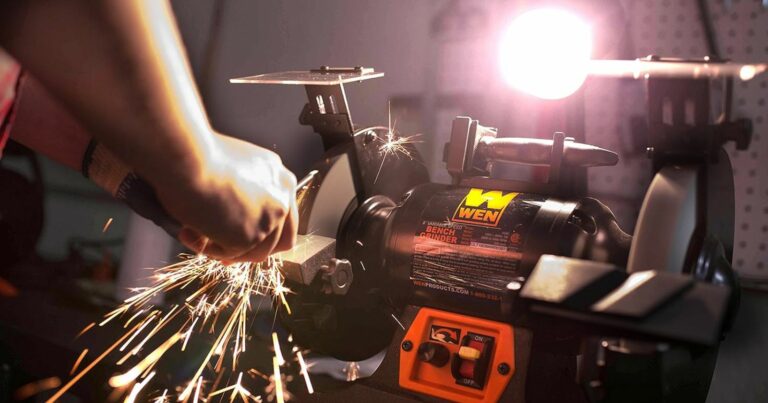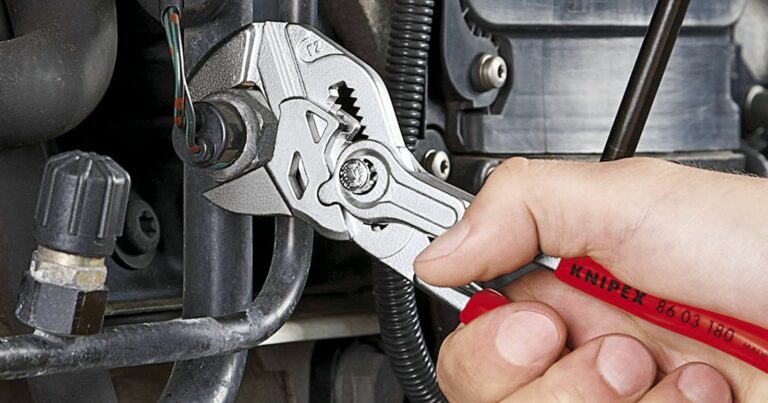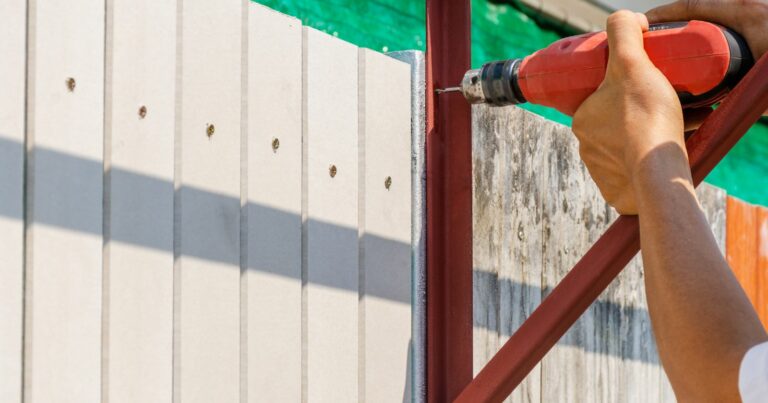The 5 Best Drill Bits For Porcelain Tile In 2024
Drilling into Porcelain Tile can be tricky, but I’ll guide you through it with some techniques to efficiently drill into Porcelain Tile without cracking the surface.
Let me tell you, drilling through porcelain tile is no walk in the park. This material is as hard and unforgiving as they come. Even if you’re a seasoned DIYer or a professional, you’ll find that choosing the Best Drill Bits For Porcelain Tile is absolutely essential for a successful project.
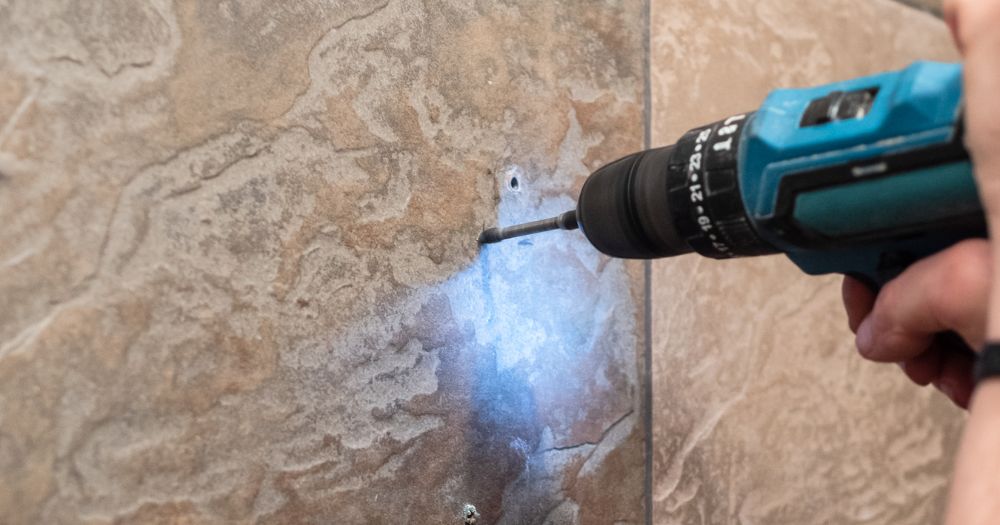
Why Choosing the Right Drill Bit Matters
The Importance of Using the Correct Drill Bit for Porcelain Tile
So, what makes porcelain tile such a tough cookie? Well, it’s a specific type of ceramic tile known for its low porosity, high density, and, yes, extreme hardness. These features make it a fantastic choice for both indoor and outdoor settings. But they also make it a real challenge to drill through. Trust me, using the wrong drill bit can open up a Pandora’s box of issues:
- Chipped Tiles: Ever seen a beautifully laid tile ruined by a chip? That’s what a standard drill bit can do.
- Uneven Holes: If your holes aren’t uniform, good luck securing any fixtures properly.
- Damaged Drills: Use the wrong bit, and you’re not just risking the tile—you could wear out your drill so much that you’ll need to repair or replace it.
- Wasted Time and Effort: I’ve seen simple jobs turn into day-long affairs, all because of the wrong drill bit.
The right drill bit is like a trusted friend—it makes your life easier, ensures your work looks professional, and saves you a ton of time and effort.
What You’ll Learn from This Guide
In this all-inclusive guide, I’ll take you through:
- The various types of drill bits that are up to the task of tackling porcelain tile, along with their pros and cons
- Key factors you should consider when picking a drill bit for your specific project
- A hands-on, step-by-step guide on how to use these drill bits effectively
- Tips and tricks to extend the life of your drill bits
- My top 5 picks for the best drill bits for porcelain tile available on the market
- Answers to all those burning questions you’ve got about drilling through porcelain tile
By the time you’re done reading, you’ll be more than ready to choose the best drill bits for your porcelain tile project, ensuring a smooth and successful finish.
The 5 Best Drill Bits For Porcelain Tile In 2023 (Updated List)
| # | Preview Images | Products | Ratings |
|---|---|---|---|
| 1 | 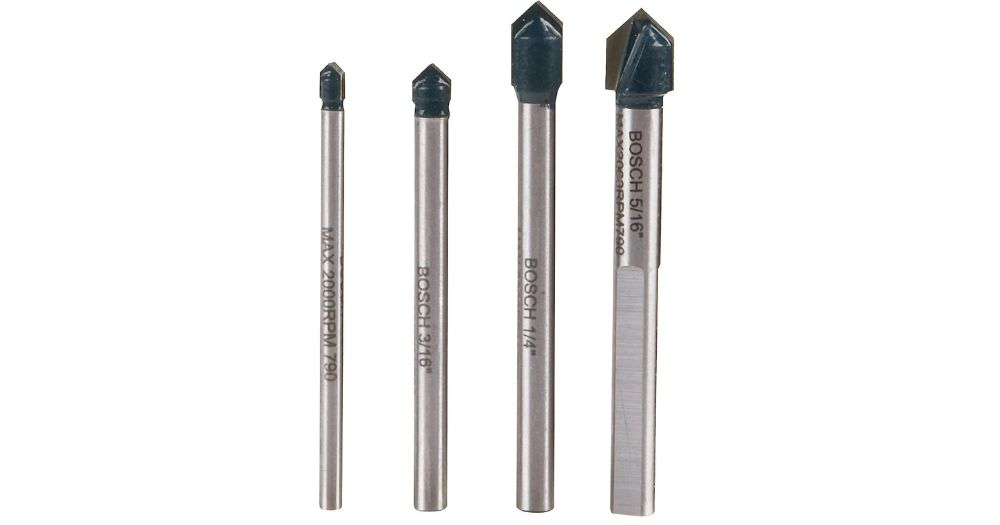 | BOSCH GT2000 4-Piece Drill Bit Set | 5.0 |
| 2 |  | Rokrou Diamond Drill Bit Saw Kit | 4.5 |
| 3 | 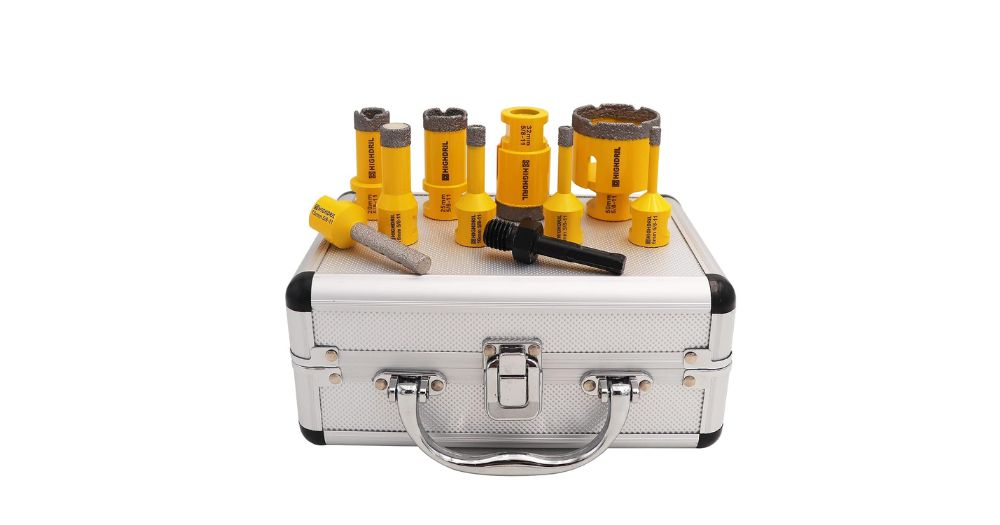 | HIGHDRIL Diamond Drill Bits Kit | 4.0 |
| 4 | 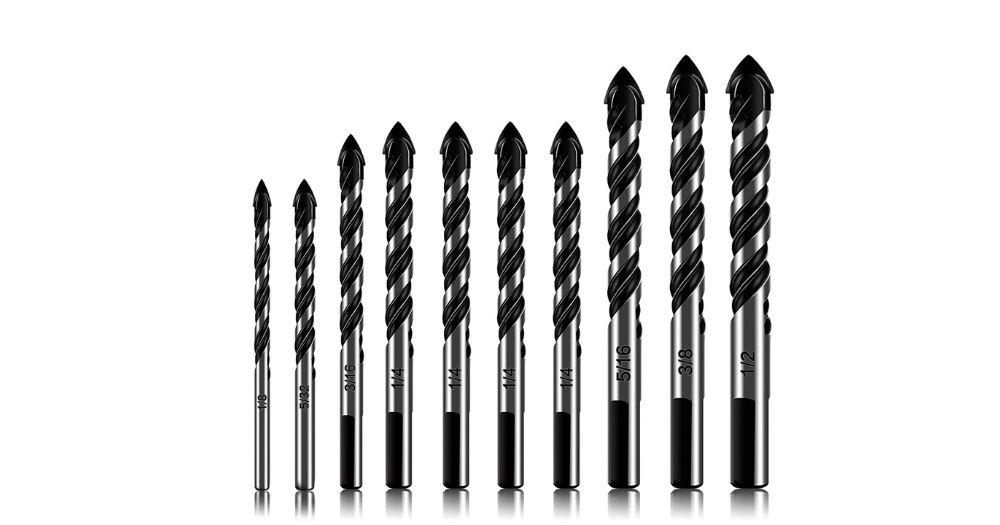 | 10-Piece Masonry Drill Bit Set | 3.5 |
| 5 | 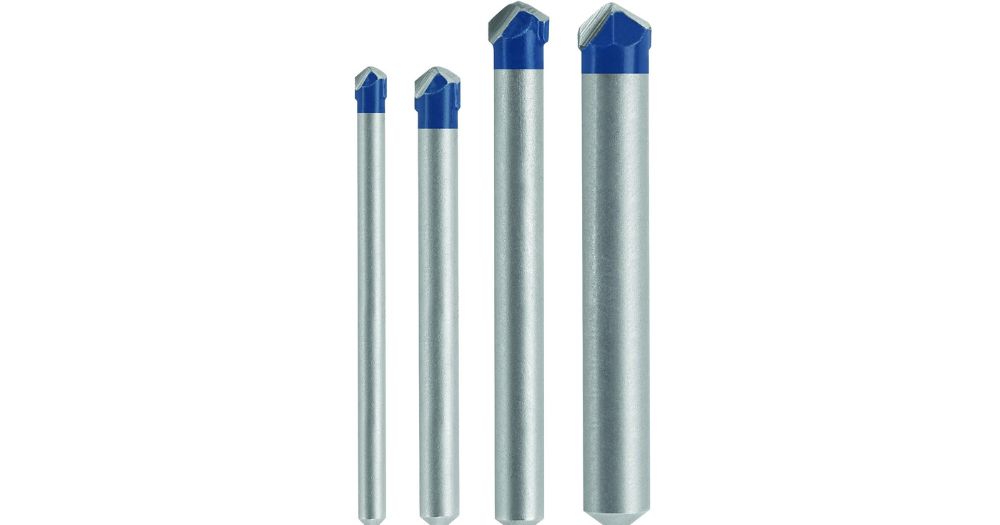 | Bosch NS2000 Drill Bit Set | 3.0 |
I will go into more detail below.
Types of Drill Bits Suitable for Porcelain Tile
So you’re standing in front of a wall of porcelain tiles, drill in hand, and you’re wondering, “Which drill bit should I use?” Believe me, I’ve been in your shoes. The good news? You’ve got options. The bad news? Picking the wrong one can turn your project into a nightmare. Let’s break down your two best friends in this situation: Diamond-Tipped and Carbide-Tipped drill bits.
Diamond-Tipped Drill Bits
If you’re after the crème de la crème of drilling performance, then diamond-tipped drill bits are where it’s at. I swear by these, especially for big projects or high-stakes jobs.
Advantages
- High Durability: Let me tell you, these bits are the marathon runners of the drilling world. That diamond coating isn’t just for show—it lets you drill through multiple tiles without breaking a sweat. This is a godsend for large projects where you can’t afford any inconsistencies.
- Precision Drilling: The diamond tip is like a surgeon’s scalpel. It allows for such precise drilling that you’ll minimize any risk of chipping or cracking your tiles, which is a lifesaver when you’re working with high-end materials.
Disadvantages
- Cost: Now, I won’t sugarcoat it—diamond-tipped drill bits are an investment. They’re pricier than other options, but if you’re looking at the long game and have multiple projects lined up, they’re worth every penny.
Carbide-Tipped Drill Bits
But hey, not all of us are running a tile-drilling factory here. If you’ve got a smaller project or you’re just drilling a few holes, carbide-tipped drill bits are your budget-friendly buddies.
Advantages
- Affordability: These bits are your go-to if you’re watching your wallet. They’re generally a lot cheaper than their diamond-tipped cousins, making them a solid choice for quick jobs or if you’re just dipping your toes into the world of DIY.
- Versatility: What I love about carbide-tipped bits is their Swiss Army knife nature. You can use them on everything from wood to metal to, of course, tile. They’re the jack-of-all-trades in your toolbox.
Disadvantages
- Less Durable: The trade-off here is durability. While they’re more versatile, carbide-tipped bits don’t have the staying power of diamond-tipped ones, particularly when you’re working with hard materials like porcelain. If you’ve got a lot of holes to drill, you might find yourself replacing these more often, which could eat into your initial savings.

Related Post –The 3 Best Drill Bits For Ceramic Pots
Factors to Consider When Choosing Drill Bits
Hold on a minute, let’s not get ahead of ourselves. Knowing your drill bits is crucial, but there’s more to the story. I’ve had my fair share of “Oh, I wish I’d thought of that” moments, and I want to save you from the same fate. So, let’s get into the nitty-gritty.
Material of the Tile
Trust me, the type of tile you’re working with is a game-changer. It’s like choosing the right shoes for a marathon; pick the wrong ones, and you’re in for a world of pain.
- Porcelain: This is the heavyweight champion of tiles. If you’re going up against porcelain, arm yourself with a diamond-tipped bit. It’s the only way to ensure durability and precision.
- Ceramic: Think of ceramic as porcelain’s less intimidating sibling. A carbide-tipped bit might get the job done, but why gamble? Go for the diamond-tipped bit for that extra peace of mind.
- Natural Stone: Working with materials like marble or granite? Don’t even think about cutting corners on your drill bit. These materials can be as unforgiving as porcelain, so diamond-tipped is non-negotiable.
Size of the Hole
Size does matter, especially when you’re drilling holes. It’s not just about the tile; it’s also about what you’re planning to put into that hole.
- Small Holes (Up to 5mm): These are your garden-variety holes for wall anchors or screws. A standard-sized bit should do, but make sure it’s sharp to avoid damaging your tile.
- Medium Holes (5mm to 10mm): Installing plumbing fixtures or using larger wall anchors? You’ll need a bit that can handle the extra girth without cracking your tile. Pro tip: always start with a smaller pilot hole.
- Large Holes (Over 10mm): For the big jobs like heavy-duty fixtures or specialized installations, you’ll need a specialized large-diameter bit. And don’t forget, your drill has to be up for the challenge, so double-check its power capabilities.
Type of Drill
Last but not least, let’s talk about your drill. It’s like choosing a dance partner; you’ve got to make sure you’re compatible.
- Cordless Drills: These are your go-to for small to medium jobs. But heed my warning: check the chuck size and power level before you start. The last thing you want is to find out your drill isn’t up to snuff halfway through the project.
- Hammer Drills: These are the heavy lifters, ideal for hard materials and a perfect match for diamond-tipped bits. But be careful; they can be overkill for softer tiles and may cause more harm than good.
- Rotary Drills: This is your everyday, run-of-the-mill drill. It’s generally compatible with both diamond and carbide-tipped bits, but always read the fine print to make sure.
Related Post-Best Glass Drill Bits
How to Use Drill Bits on Porcelain Tile
So, you’re all set with your drill bits and can’t wait to get started, huh? Well, pump the brakes for a second. Drilling into porcelain tile is a whole different ball game compared to drilling into wood. Trust me, I’ve been there, and I’m here to guide you through this, step by step.
Safety Measures
First things first—safety. I’ve seen enough DIY disasters to know that this isn’t a step you want to skip.
- Eye Protection: Listen, I’ve had porcelain shards fly at me like tiny missiles. You do not want that experience. Always wear safety goggles that fit snugly and don’t obstruct your vision.
- Gloves: I always use heavy-duty gloves that offer both protection and flexibility. You need to shield your hands from any flying debris, but you also need to keep a firm grip on that drill.
Watch This Video And Learn About The 5 Best Drill Bits For Porcelain Tile In 2023
Step-by-Step Guide
Alright, let’s roll up our sleeves and get into the details. Here’s how you drill into porcelain tile without turning it into a jigsaw puzzle—or hurting yourself.
Preparing the Tile
- Cleaning: Trust me, a clean tile is a drillable tile. Any dirt or grime can make your drill bit slip, and you don’t want that. A quick wipe-down with a dry cloth is usually all it takes.
- Securing the Tile: If you’re working with a loose tile, clamp that bad boy down. You don’t want it moving around while you’re drilling. And if it’s a wall tile, make sure the surrounding area is clear and safe.
Marking the Drilling Point
- Measure Carefully: I can’t stress this enough—measure twice, drill once. Use a tape measure or a ruler to pinpoint exactly where you want that hole.
- Marking: I usually mark the spot with a pencil or chalk. Some folks like to put a small ‘X’ made of masking tape over the drilling point. It helps guide the drill bit and prevents it from slipping.
Drilling Process
- Insert the Drill Bit: Before you start, make sure your drill bit is locked and loaded. Give it a little tug to ensure it’s securely fastened into the drill chuck.
- Pilot Hole: Always start with a small pilot hole at a low speed. It’s like drawing an outline before filling in a sketch—it guides your main hole and keeps your drill bit from wandering off course.
- Main Drilling: Once your pilot hole is set, you can ramp up the speed. But be gentle; apply steady pressure without forcing it. The last thing you want is to crack that beautiful tile.
- Cooling: Here’s a pro tip—porcelain heats up when you drill into it. To prevent overheating and potential cracking, I periodically pull the drill bit out and let it cool for a few seconds.
Maintenance and Care for Your Drill Bits
So you’ve drilled your holes, and you’re feeling like a DIY champion. But hold on a minute—what about those drill bits? They’ve done the heavy lifting, and they deserve some love. I’ve learned the hard way that a little maintenance can make your drill bits last a whole lot longer. So let’s break it down.
Cleaning
Believe me, cleaning your drill bits isn’t just a courtesy; it’s a necessity. A clean drill bit is a happy drill bit, and who doesn’t want happy tools?
- Immediate Wipe-Down: The first thing I do after using my drill bits is give them a quick wipe with a clean, dry cloth. It’s like brushing your teeth—you don’t want to let the grime settle in.
- Deep Cleaning: For those bits that have been through a tough job, they deserve a spa day. I soak them in warm water with a splash of mild detergent for about 10-15 minutes. Then, I gently scrub them with a soft-bristle brush to get rid of any stubborn gunk.
- Specialized Cleaners: For my premium bits, like the diamond-tipped ones, I go the extra mile and use specialized cleaning solutions. It’s a small investment that pays off big time in the long run.
- Drying: Don’t underestimate the power of drying. I pat my bits dry with a towel and let them air out for a few extra minutes. Trust me, you don’t want to deal with rust.
Storage
Now, let’s talk storage. Where you stash your drill bits can make or break their lifespan. I’ve got some storage hacks that have never let me down.
- Climate-Controlled Environment: I always store my drill bits in a cool, dry place. You’d be surprised how much damage a little humidity can do.
- Organized Storage: I’m a bit of an organization freak, so I keep my drill bits in a dedicated case with separate compartments for each type and size. It’s like a luxury hotel for my bits—they don’t just jumble around and scratch each other.
- Silica Gel Packs: Here’s a pro tip for you—I toss a few silica gel packs into my drill bit case. These little wonders absorb any lingering moisture and act as a shield against rust.
- Regular Checks: Every so often, I pull out my drill bits for a quick inspection. A little preventive care can save you a lot of money and headaches down the line.
Top 5 Best Drill Bits For Porcelain Tile
So you’ve learned how to drill and how to take care of your bits, but what about choosing the right one to begin with? After years of hands-on experience and countless hours of research, here are my top 5 picks for the best drill bits for porcelain tile.
1. BOSCH GT2000 4-Piece Drill Bit Set – Best Overall

The BOSCH GT2000, a 4-piece carbide drill bit set designed for precision and durability. Crafted with a carbide material and coated with an oxide finish, these drill bits are engineered for long-lasting performance. The set includes four different bit sizes: 1/8″, 3/16″, 1/4″, and 5/16″, making it versatile for various drilling needs. With a 3-flat shank type and straight flute design, these bits are optimized for stability and efficient debris removal. The GT2000 is ideal for drilling into glass surfaces, boasting a minimum bore diameter of 0.75 inches. Weighing just 1.28 ounces, this corded-electric powered tool is both lightweight and robust. The set comes in a sleek silver color and includes a total of four bits, all measured in the inch system. No batteries are required, and unfortunately, no warranty is provided.
Pros
- Material Durability: Made of carbide, these bits are designed for long-term use.
- Versatility: Comes with four different bit sizes to suit a range of drilling needs.
- Efficient Design: The 3-flat shank and straight flute type ensure stability and effective debris removal.
- Lightweight: At just 1.28 ounces, the tool is easy to handle and maneuver.
- No Batteries Required: Being corded-electric, there’s no need to worry about battery life.
Cons
- Surface Limitation: Primarily recommended for glass surfaces, which may limit its versatility.
- No Warranty: The product comes without a warranty, which could be a concern for some users.
- Single Package Quantity: Only one set is included per package, which may not be sufficient for larger projects.
- Power Source: Being corded-electric may limit mobility compared to battery-operated options.
2. Rokrou Diamond Drill Bit Saw Kit – Best Budget for Tile

The Rokrou 15PCS White Diamond Hole Saw set, a versatile and comprehensive drilling solution designed for a multitude of materials including Porcelain, Glass, Ceramic, Marble, and more. Crafted from a blend of Carbon Steel, Ceramic, Diamond, Glass, Marble, and Nickel, this set is the epitome of durability and adaptability. The set comes in a compact size of 0.79 x 4.72 x 3.54 inches, making it easy to store and transport. With its adjustable style, it offers flexibility for various drilling needs. The 15-piece set is specifically engineered to be compatible with materials like porcelain, glass, ceramic, and marble, providing you with a one-stop solution for all your drilling projects.
Pros
- Material Versatility: Made from a diverse range of materials like Carbon Steel, Ceramic, Diamond, and more, ensuring durability and longevity.
- High Compatibility: Designed to work seamlessly with a variety of materials including Porcelain, Glass, Ceramic, and Marble.
- Comprehensive Set: Comes with 15 pieces, offering a wide range of options for different drilling requirements.
- Adjustable Style: Provides flexibility for various drilling needs, making it a versatile tool.
- Compact Size: The dimensions make it easy to store and transport, ideal for both professional and DIY use.
Cons
- Specialized Use: While it’s highly compatible with certain materials, it may not be suitable for all types of surfaces.
- No Mention of Warranty: The absence of a warranty could be a concern for potential buyers.
- Complexity: With 15 pieces and adjustable settings, it might be overwhelming for beginners.
3. HIGHDRIL Diamond Drill Bits Kit – Best if You Can Afford

The HIGHDRIL Diamond Drill Bit, a specialized tool designed for high-precision drilling on a variety of surfaces. Made entirely of diamond material, this drill bit is not only durable but also incredibly efficient. It comes in a striking yellow color, making it easy to spot among your other tools. With its compact style, it is easy to handle and store, making it a convenient addition to any toolbox. The HIGHDRIL Diamond Drill Bit is compatible with a range of materials including Porcelain, Ceramic, Marble, and Stone, making it a versatile choice for both professionals and DIY enthusiasts.
Pros
- High Durability: Made of diamond, one of the hardest materials, ensuring longevity and consistent performance.
- Wide Compatibility: Suitable for drilling into Porcelain, Ceramic, Marble, and Stone, offering versatility in applications.
- Compact Design: Its small size makes it easy to handle, store, and transport.
- Vibrant Color: The yellow color makes it easily identifiable, reducing the time spent searching for the right bit.
Cons
- Single Piece: Comes as just one piece, which may not be sufficient for projects requiring multiple sizes.
- No Mention of Warranty: The absence of a warranty could be a concern for some users.
- Specialized Use: While it’s highly compatible with certain materials, it may not be suitable for all types of surfaces.
4. 10-Piece Masonry Drill Bit Set

The DKIBBITH Carbide Drill Bit, a robust and versatile tool engineered for high-performance drilling. Made from durable carbide material, this drill bit is designed to last, offering consistent and reliable performance. It features a straight flute type that ensures efficient debris removal and a triangle shank for enhanced grip and stability. The bit is finished to be compatible with a variety of metals including Aluminum, Stainless Steel, Iron, and Steel, making it a versatile addition to any toolbox. Whether you’re a professional tradesperson or a DIY enthusiast, the DKIBBITH Carbide Drill Bit is your go-to tool for precise and efficient drilling.
Pros
- Durable Material: Made from carbide, known for its longevity and resistance to wear.
- Multi-Surface Compatibility: Designed to work with Aluminum, Stainless Steel, Iron, and Steel, offering a wide range of applications.
- Efficient Design: The straight flute type ensures efficient debris removal, making your drilling process smoother.
- Stable Grip: The triangle shank provides enhanced grip and stability during drilling, reducing the chance of slippage.
Cons
- Limited Versatility: While it’s highly compatible with metals, it may not be suitable for other types of materials like wood or plastic.
- No Mention of Additional Features: The absence of information about the number of pieces in the set, warranty, or other features may leave potential buyers with questions.
- Specialized Use: The specific finish types suggest that this bit is specialized for certain materials, which may limit its overall versatility.
5. Bosch NS2000 Drill Bit Set

The BOSCH High-Speed Steel Drill Bit, a compact yet powerful tool designed for a range of drilling applications. Crafted from high-speed steel, this drill bit offers both durability and speed, ensuring that your drilling tasks are completed efficiently. Measuring at 1.75 x 4.75 x 1.92 inches, it’s compact enough for easy storage and transport. The bit features a straight shank for a secure grip and a 3-flat tool flute type, which aids in better debris removal and reduces drag. Whether you’re a professional tradesperson or a DIY hobbyist, this BOSCH drill bit is a reliable addition to your toolbox.
Pros
- High-Speed Steel Material: Ensures durability and allows for quick drilling, making your tasks more efficient.
- Compact Dimensions: The small size makes it easy to store and carry, ideal for both professional and personal use.
- Efficient Debris Removal: The 3-flat tool flute type is designed for effective debris removal, leading to smoother drilling.
- Secure Grip: The straight shank ensures a secure grip in the drill chuck, reducing the risk of slippage.
Cons
- Limited Material Compatibility: While high-speed steel is versatile, it may not be the best choice for extremely hard materials.
- Single Piece: The product comes as a single piece, which may not be sufficient for projects requiring multiple sizes.
FAQs
When it comes to drilling into porcelain tiles, you might find yourself grappling with questions about the right drill bits to use, the best techniques for a clean hole, and how to avoid damaging your beautiful tiles. That’s why I’ve put together this FAQ section. I want to tackle the questions you’re most likely to have, offering you clear and concise answers that are perfect for quick reference or for Google’s People Also Ask (PAA) feature.
Can I use a regular drill bit for porcelain tile?
A simple trick I use is to place a piece of painter’s tape where I plan to drill. The tape gives the drill bit some extra grip, making it easier to start your hole. You can also start at a slow speed to create a ‘pilot’ hole, which helps to keep the drill bit from wandering.
How can I prevent my drill bit from slipping on the tile?
A simple trick I use is to place a piece of painter’s tape where I plan to drill. The tape gives the drill bit some extra grip, making it easier to start your hole. You can also start at a slow speed to create a ‘pilot’ hole, which helps to keep the drill bit from wandering.
Do I need to use water when drilling into porcelain tile?
Absolutely, especially if you’re using a diamond-tipped drill bit. A little water goes a long way in cooling down the drill bit and reducing friction. This not only extends the life of your drill bit but also results in a cleaner, more precise hole.
By answering these FAQs, I aim to make your porcelain tile drilling project as straightforward and successful as possible. Don’t forget to consult the manufacturer’s guidelines for both the tiles and the drill bits to make sure you’re on the right track with your specific materials.

To Sum Up The 5 Best Drill Bits For Porcelain Tile In 2023
Drilling into porcelain tile requires specialized drill bits to ensure a clean, precise hole without damaging the tile. The article discussed the importance of using diamond-tipped or carbide-tipped drill bits for this purpose. It also highlighted the need for proper drilling techniques, such as applying minimal pressure and drilling at a moderate pace, to avoid cracking or chipping the tile.
The article provided an in-depth review of various drill bit sets, evaluating them based on material, number of bits included, diameter, pros, and cons. The sets ranged from budget-friendly options like the BOSCH GT2000 to more premium sets like the HIGHDRIL Diamond Drill Bits Kit. Each set was assessed for its suitability for different types of porcelain tile, ease of use, and durability.
Final Recommendations
- For Budget-Conscious Buyers: If you are looking for a budget-friendly option, the BOSCH GT2000 offers a decent performance at a reasonable price. However, it’s more suitable for softer tiles.
- For Quality and Versatility: The HIGHDRIL Diamond Drill Bits Kit is the best overall option if you can afford it. It offers a range of sizes and is suitable for various materials, including harder porcelain tiles.
- For DIY Enthusiasts: The Rokrou Diamond Drill Bit Saw Kit is a great choice for those who enjoy DIY projects. It comes with 15 different sizes and a drill guide, making it versatile and user-friendly.
- For Long-Term Use: If you are looking for durability, consider drill bits that come with a reinforced head and are made from high-quality materials like artificial diamond and steel.
- For General Use: If you’re not sure about the hardness of the tiles you’ll be drilling into, a set that offers a range of bit sizes and materials, like the 10-Piece Masonry Drill Bit Set, could be a good starting point.

